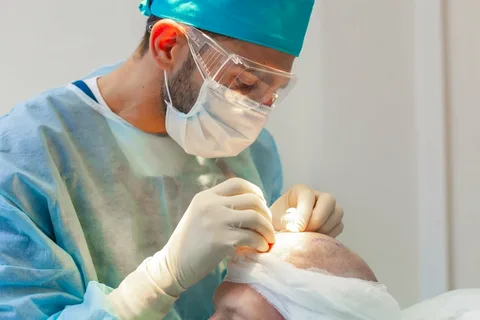Hair loss can be a distressing experience for many individuals, impacting self-esteem and confidence. In Abu Dhabi, the consultation process for hair loss offers patients a structured approach to understanding their condition and exploring potential treatment options. This article will guide you through the various steps involved in the Hair transplantation in Abu Dhabi ( زراعة الشعر في ابوظبي ) consultation process, ensuring you are well-prepared and informed.
What to Expect During a Hair Loss Consultation
Initial Assessment
The first step in the hair loss consultation process typically involves an initial assessment, where the patient meets with a qualified specialist or trichologist. This assessment usually includes:
- Medical History Review: The consultant will ask about your medical history, including any previous hair loss treatments, underlying health conditions, medications, and family history of hair loss.
- Lifestyle Evaluation: Your consultant may inquire about your lifestyle, including stress levels, diet, and hair care routines, as these factors can contribute to hair loss.
Physical Examination
Following the initial assessment, the consultant will perform a physical examination of your scalp and hair. This examination may involve:
- Scalp Inspection: The consultant will examine your scalp for signs of hair thinning, bald patches, or other abnormalities.
- Hair Density Analysis: Using specialized tools, the consultant may measure hair density in different areas of your scalp to assess the extent of hair loss.
Diagnostic Testing
In some cases, the consultant may recommend diagnostic tests to identify the underlying cause of hair loss. These tests could include:
- Blood Tests: To check for hormonal imbalances, nutritional deficiencies, or autoimmune disorders.
- Scalp Biopsy: In rare cases, a small sample of the scalp may be taken for laboratory analysis to diagnose specific conditions.
Understanding Your Hair Loss Type
Identifying the Cause
During the consultation, the specialist will help you understand the type of hair loss you are experiencing. The most common types include:
- Androgenetic Alopecia: Often referred to as male or female pattern baldness, this hereditary condition is characterized by gradual thinning of hair.
- Telogen Effluvium: This temporary condition is usually triggered by stress, hormonal changes, or illness, leading to diffuse hair shedding.
- Alopecia Areata: An autoimmune condition that causes sudden hair loss in patches.
Personalized Diagnosis
Based on the assessment and diagnostic tests, the consultant will provide a personalized diagnosis. Understanding your hair loss type is crucial for determining the most effective treatment options.
Exploring Treatment Options
Medical Treatments
Once the cause of hair loss is established, the consultant will discuss various medical treatment options, including:
- Minoxidil (Rogaine): A topical treatment that can stimulate hair growth and slow hair loss.
- Finasteride (Propecia): An oral medication primarily used for male pattern baldness that works by blocking hormones that contribute to hair loss.
Surgical Treatments
For individuals seeking more permanent solutions, surgical options may be considered, such as:
- Hair Transplantation: This involves relocating hair follicles from areas of dense growth to balding or thinning areas.
- Follicular Unit Extraction (FUE): A minimally invasive technique that extracts individual hair follicles for transplantation.
Discussing Lifestyle Changes
Importance of Healthy Habits
During the consultation, the specialist may emphasize the importance of lifestyle changes to complement any medical or surgical treatments. These changes can include:
- Nutritional Guidance: Adopting a balanced diet rich in vitamins and minerals essential for hair health, such as biotin, zinc, and iron.
- Stress Management: Techniques such as meditation, yoga, or counseling can help reduce stress, which may contribute to hair loss.
Hair Care Practices
The consultant may also provide advice on proper hair care practices, including:
- Gentle Hair Care: Avoiding harsh hair products and minimizing heat styling to reduce damage.
- Regular Scalp Massage: Promoting blood circulation to the scalp, which may support hair growth.
Setting Realistic Expectations
Understanding Treatment Outcomes
One crucial aspect of the consultation process is setting realistic expectations regarding the results of any treatment. The consultant will explain that:
- Results Take Time: Most treatments require several months to show noticeable results, and patience is essential.
- Individual Variability: The effectiveness of treatments can vary based on individual factors, including genetics and the severity of hair loss.
Follow-Up Appointments
Regular follow-up appointments are typically recommended to monitor progress and adjust treatment plans as needed. The specialist will discuss the importance of these appointments in achieving the best possible outcome.
Conclusion
The hair loss consultation process in Abu Dhabi is a vital first step for anyone experiencing hair loss. By understanding the various stages of the consultation, from initial assessment to exploring treatment options, patients can feel empowered to make informed decisions about their hair restoration journey. With the right guidance and support, regaining a full head of hair and boosting self-confidence is within reach. If you are considering a consultation for hair loss, take the first step today and schedule an appointment with a qualified specialist in Abu Dhabi.





Comments